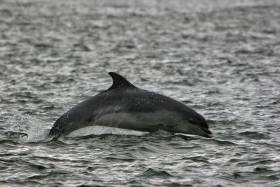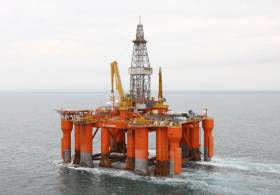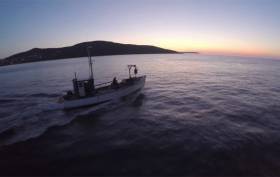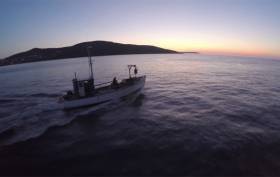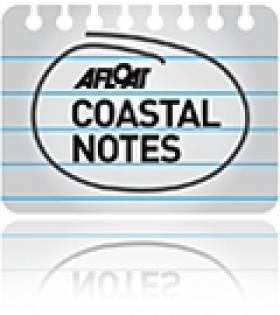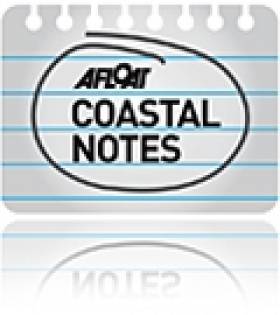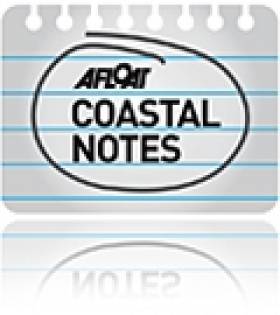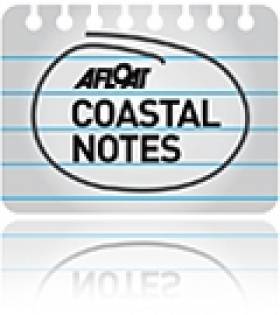Displaying items by tag: Oil & Gas
Kerry Gas Terminal Plan Faces Legal Challenge Over Dolphin Habitat & Changes In Climate Law
#CoastalNotes - Extension of planning permission for a €500 million gas terminal at Ballylongford on the Kerry coast now faces judicial review, as Green News reports.
Friends of the Irish Evironment (FiE) was granted leave in the High Court to review An Bord Pleanála’s decision to extend permission originally granted in 2008, on the basis that relevant climate law has changed in recent years.
FiE also contends that the environmental assessment submitted with the original application does not take into account a later survey of the area by the National Parks and Wildlife Service.
This 2012 survey identified the earmarked site for the terminal’s jetty as a “critical habitat” for bottlenose dolphins.
Green News has much more on the story HERE.
Do You Believe In Life After Oil? Pop Star Cher Backs Bill To Ban Irish Offshore Drilling
#Oil&Gas - Cher has backed a bill to ban offshore drilling for oil and gas in Irish waters that passed its first vote in the Dáil yesterday (Thursday 8 February).
Using the hashtag #HellToTheYes, the pop music legend threw her support behind the Petroleum and Other Minerals Development (Amendment) (Climate Emergency Measures) Bill after an appeal on Twitter by Green Party Dáil researcher Sinéad Mercier.
The so-called ‘Climate Emergency’ bill seeks to end the granting of offshore licences for oil and gas exploration or drilling, and would make Ireland the fourth country in the world to introduce such a ban.
— Cher (@cher) February 8, 2018
Oil industry representatives say the bill in its current form will create “significant degrees of uncertainty” in the industry, according to the Irish Examiner. The locally unpopular Kish Bank prospect in Dublin Bay is among those that would be affected should the bill go further.
The Solidarity-People Before Profit bill passed by 78 to 48 on a day that saw the Government doubly defeated as opposition TDs rallied to approve a review of tendering for the National Broadband Plan, days after eir announced its withdrawal from the project.
'Atlantic' Director Talks Impact Of Economic & Ecological Change On Coastal Communities
#Documentary - "It’s about understanding the ocean, working with the ocean. Not just seeing it as something to grab, but as something you look after."
That's the message of new documentary Atlantic by Irish filmmaker Risteard Ó Domhnaill, who spoke to Ian Maleney for The Irish Times on its release in Irish cinemas yesterday (Friday 29 April).
As previously reported on Afloat.ie, the feature-length documentary – narrated by Emmy Award-winner Brendan Gleeson – follows the fortunes of three small Atlantic coastal fishing communities in Ireland, Canada and Norway.
Each facing their own challenges, from the impact of oil exploration and climate change to the pressures of large-scale commercial fishing.
And as Ó Domhnaill relates from his experience making the film, these livelihoods have changed dramatically even in only the last five years.
"Who knows what’s going to happen, what’s going to hit the ocean?" he says of the years ahead. "Acidification, warming of currents? We’re facing a crossroads. We can’t just fence off our part of the sea and say ‘We’ll look after that’. It’s a much bigger challenge."
The Irish Times has much more on the story HERE.
#Documentary - A new documentary from the maker of The Pipe takes on the powerful interests "carving up" Ireland's ocean resources.
Opening in Ireland on 29 April, Risteard Ó Domhnaill's Atlantic is narrated by Emmy Award-winner Brendan Gleeson, and was awarded the Best Irish Documentary prize at the recent Audi Dublin International Film Festival.
Shot across Ireland, Norway and Newfoundland in Canada by Scannáin Inbhear/Inver Films, Atlantic expands upon the controversial subject matter of his previous film – the experiences of Rossport residents opposed to Shell's prospect in the Corrib gas field – to tell a wider story of threats to coastal communities not only in Ireland, but around the North Atlantic Rim.
Atlantic follows the fortunes of three small fishing communities as they struggle to maintain their way of life in the face of mounting economic and ecological challenges.
'Atlantic' - the race for the resources of the North Atlantic from Risteard O Domhnaill on Vimeo.
As the oil majors drive deeper into their fragile seas, and the world’s largest fishing companies push fish stocks to the brink, coastal people and the species they rely on may be reaching a point of no return.
In Norway, fishermen and their resource have historically been aggressively protected by national authorities. But as oil fields dwindle and the country now looks to add to its reserves, Arctic cod fisherman Bjornar Nicolaisen is campaigning against seismic testing by the oil explorers criss-crossing his fishing grounds.
On the outer edges of Norway’s five-star economy, seismic blasting is threatening to blow Bjornar’s livelihood out of the water.
Across the ocean in Newfoundland, where an oil boom has hit, fisherman Charlie Kane will likely be the last of his generation to work the sea, after a cod fishing ban in the 1990s brought a world-renowned industry to a halt overnight.
Charlie is thankful his sons can now make a good living on the oil rigs, and won’t need to toil in small boats on Newfoundland’s perilous Grand Banks. But now, as oil prices plummet, their village is once more taking on water, as the the quick money of the black gold rush begins to run dry.
Meanwhile, in the West of Ireland, Jerry Early has seen the heart ripped out of his island after a ban on drift netting for wild salmon. As he fights to regain his fishing rights, and as foreign super-trawlers operate with impunity just offshore, Jerry feels like a criminal on his own boat.
The circumstances could be dire if he defies the 'new order of the ocean', but as the unofficial 'mayor' of a dying island, Jerry feels he has to face up to powerful interests before it’s too late.
Filmed in some of the most remote and breathtaking locations in the North Atlantic, and at close quarters with some of the sea’s most captivating characters, Atlantic brings the very personal stories in the vital resource debate to the fore, exploring how three modern-day communities must learn from the past in order to secure a brighter future.
Risteard O’Domhnaill said of his new film: “My last documentary, The Pipe, told the story of a small coastal community as they faced down one of the world’s most powerful oil companies, which was forcing a high-pressure raw gas pipeline through their farms and fishing grounds.
"The story raised more questions for me than it answered, leading me to look at the politics of our oil and gas prospects off the Irish coast. What has since unfolded is an incredible story of resource mismanagement, and the capture of our offshore riches — oil, gas and fishing — whilst our gaze is elsewhere.
“Unfortunately, what I found when I looked across the Atlantic is that Ireland’s tale is not unique. However, in both Norway and Newfoundland, the lessons learned by similarly affected communities can help us to chart a different course, before our most renewable resources are damaged beyond recognition, or sold to the highest bidders.”
Commenting on his involvement, Brendan Gleeson said: “Atlantic is an engrossing piece of truth-seeking, visually stunning and crafted with clarity and insight. It was an honour to be involved.”
As previously reported on Afloat.ie, Atlantic started as an ambitious crowdfunding project, but is now backed by Bord Scannán na hÉireann (The Irish Film Board), the Canadian Broadcasting Corporation, the Newfoundland and Labrador Film Development Corporation and Nordnorsk Filmsenter (the North Norwegian Film Centre).
The feature-length documentary opens in Dublin exclusively at the Irish Film Institute on Friday 29 April, with director Risteard O’Domhnaill joined by Arranmore and Rossaveal shermen for a discussion following the 8.30pm screening on the first night. For more see the official film website HERE.
Reduced Costs Drive Barryroe Oil Field Farm-Out Interest
#Oil&Gas - A drop in exploration costs alongside the fall in commodities prices is driving increased interest in Providence Resources' Barryroe prospect, as The Irish Times reports.
"Work continues with a number of parties to progress the Barryroe farm out to a satisfactory conclusion,” said Tony O’Reilly, chief executive of the Dublin-based oil and gas exploration firm.
It comes more than a year after negotiations over the farm-out of the oil field off Ireland's south coast began, a process that the company said was "taking much longer to achieve" due to unfavourable market conditions.
Studies in 2012 indicated that the Barryroe field could yield as much as 1.6 billion barrels, and be worth many billions to the Irish economy.
The Irish Times has more on the story HERE.
Providence Divesting Almost One-Third Of Spanish Point Interest
#Oil&Gas - Providence Resources is divesting almost a third of its interest in its Spanish Point prospect, as The Irish Times reports.
The Irish oil and gas exploration company intends to sell off a 32% "non-operated interest" in the area off the coast of Co Clare, in the northern part of the Porcupine Basin, which has been shown to hold enormous reserves of oil.
Providence delayed its own exploration at Spanish Point earlier this year due to "unforeseen changes" to its joint venture at the well.
But drilling is now expected to take place in 2017 pending State approval.
The Irish Times has more on the story HERE.
Spanish Point Drilling Delayed By Oil & Gas Exploration Firm
#Oil&Gas - Providence Resources has delayed exploration of its Spanish Point well off Co Clare "pending discussions with partners and the Government", as The Irish Times reports.
Already pushed back from last summer due to the longer-than-planned refurbishment of the Blackford Dolphin rig, the Spanish Point option - granted in January last year – was subsequently seismic surveyed for oil and gas condensate in the autumn.
The latest delay, however, comes after "recent unforeseen changes to the make-up of the joint venture".
That's according to Providence chief executive Tony O'Reilly, who adds that discussions with interested third parties for the prospect continue.
The Irish Times has more on the story HERE.
Providence Positive About Drombeg Prosect
#Oil&Gas - Providence Resources is talking positive about its Drombeg prospect off the south-west coast, as The Irish Times reports.
The site in the southern Porcupine Basin was surveyed last summer by the Polarcus Amani, said to be one of the greenest seismic vessels in the world, in what was one of the largest 3D seismic surveys yet carried out off Ireland.
And the preliminary results have revealed "seismic morphologies" that are "consistent with those of a large deep-water fan system".
What's more, the site has already "attracted expressions of interest from a number of major international oil companies," says Providence technical director John O'Sullivan.
The Irish Times has more on the story HERE.
Petronas Subsidiary Takes Majority Stake In East Kinsale Gas Prospect
#Oil&Gas - Kinsale Energy will take an 80% stake in Landsdowne Oil and Gas's Midleton/East Kinsale gas prospect in the Celtic Sea, as The Irish Times reports.
The deal will see the Petronas subsidiary assume 100% of costs for drilling on the prospect and will fund Lansdowne's costs of testing for up to $2.5 million.
Kinsale Energy, which was formerly Marathon Oil, already holds an interest in the Deep Kinsale Prospect beneath the Kinsale Head Gas Field, thanks to its option agreement with Fastnet Oil & Gas last year.
The Irish Times has more on the story HERE.
Shell Gives Up On Rockall, Says 'No Further Potential'
#Oil&Gas - The Irish Times reports that Shell and its partners have relinquished their State licence for hydrocarbon exploration at Rockall, claiming that it has "no further potential".
The decision – which means Shell no longer holds any offshore exploration licences in the State's waters – comes as a blow to a Government that recently announced the redoubling of its efforts to survey our coastal waters for new and exploitable oil and gas resources.
However, it is not unprecedented, as Shell admitted upon receipt of its licence for the Rockall Basin off Donegal in 2005 that the risk and expense of drilling at such a marginal deep-water site worked against any potential commercial gains.
The rapidly falling prices of oil and gas may also be playing a role in redirecting oil companies' attentions away from more peripheral prospects. The Irish Times has more on the story HERE.


























